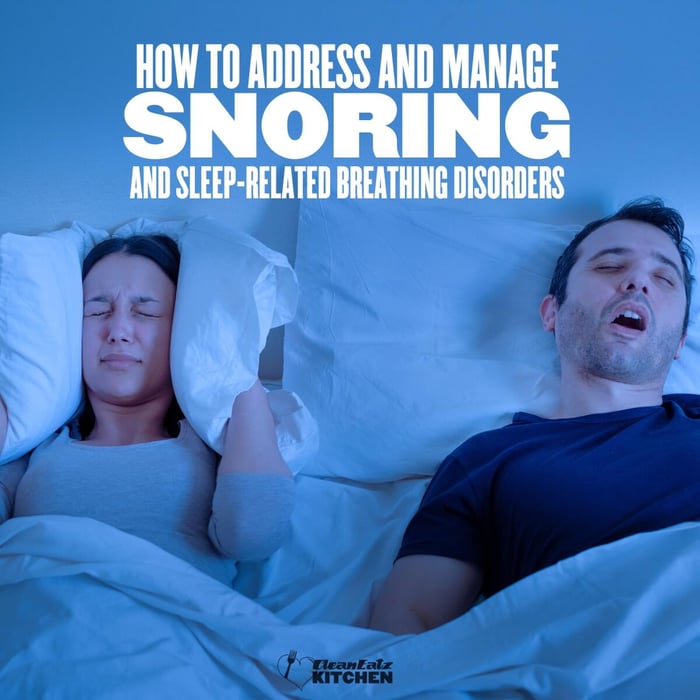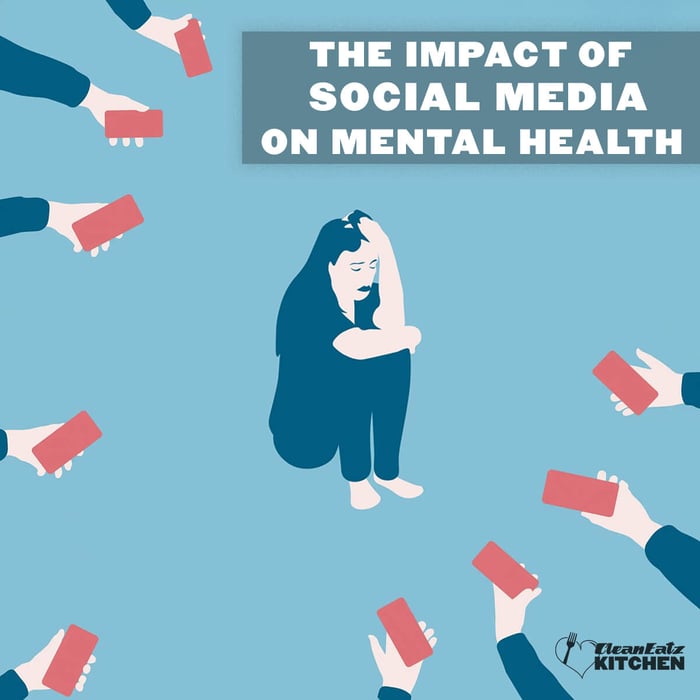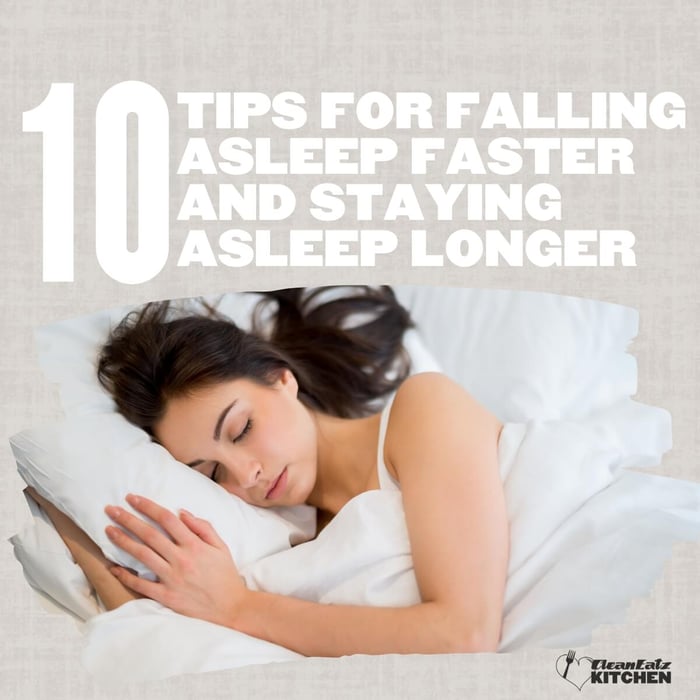How To Address And Manage Snoring And Sleep-Related Breathing Disorders

Jason Nista
Healthy Lifestyle
|
Sleep
03/17/2023 12:00pm
8 minute read
Snoring and sleep-related breathing disorders are common health issues that can significantly impact the quality of your sleep and overall well-being. If you or your partner are struggling with snoring or sleep-related breathing disorders, it's essential to seek help and find a management solution that works for you.
What Is Sleep Apnea and What Are the Symptoms?
The sleep disturbance known as sleep apnea affects millions of people internationally. During slumber, it is common for individuals to experience pauses in breathing which can lead to serious health issues if left untreated. When it comes to sleep apnea, there are three types symptoms of sleep apnea you should be aware of: central sleep apnea (CSA), obstructive sleep apnea (OSA), and complex sleep apnea. Knowing the distinction between each is essential in recognizing how best to address your condition.
- Obstructive sleep apnea(OSA) is the most widespread type of sleeping disorder and takes place when throat muscles get too relaxed, thereby obstructing the airway while asleep. As a result, your breath may be shallow, or you might even stop breathing during the night. Symptoms of OSA include loud snoring, daytime fatigue, and waking up with a dry mouth or sore throat.
- Central sleep apnea (CSA) is not as widespread as obstructive sleep apnea, and it occurs when your brain fails to deliver signals that instruct the muscles responsible for breathing. CSA can be caused by certain medical conditions, such as stroke or heart failure, but it can also occur on its own without any underlying medical condition. Symptoms of CSA include difficulty staying asleep, morning headaches, and feeling tired during the day despite getting enough rest at night.
- Complex sleep apnea syndrome (CompSAS) is a combination of both OSA and CSA. It occurs when a person has both types of sleep apnea at once and can be more challenging to diagnose than either type alone. Symptoms of CompSAS are similar to those of OSA and CSA but may be more severe due to the combination of both types.
All types of sleep apnea can have serious consequences if left untreated; however, sleep apnea treatment are available for all types of sleep apnea that can help manage symptoms and improve the overall quality of life. When it comes to the importance of sleep, there are no two ways about it - how well and how long we sleep affects every aspect of our lives, from the quality of the day-to-day to the effect on our overall health.
Understanding Snoring and Sleep-Related Breathing Disorders
Snoring is a common condition that occurs when there is an obstruction in the airway during sleep, causing vibration in the throat and resulting in a loud noise. Sleep-related breathing disorders, such as sleep apnea, are more severe forms of snoring and can have significant health consequences if left untreated.
Causes of Snoring and Sleep-Related Breathing Disorders
There are several factors that can contribute to snoring and sleep-related breathing disorders, including obesity, alcohol consumption, nasal congestion, and sleeping position. In some cases, underlying health conditions, such as nasal polyps or deviated septum, can also contribute to snoring and sleep-related breathing disorders.
Who Is Most Likely To Develop Sleep Apnea?
Sleep apnea can affect anyone, but it is more common in adults over the age of 40, people who are overweight, and those with certain medical conditions such as diabetes or heart disease. In addition, men are more likely to develop sleep apnea than women, and people with large necks (17 inches or greater for men and 16 inches or greater for women) are also at higher risk.
Other risk factors include having large tonsils, a family history of sleep apnea, diabetes, cardiovascular diseases, or being post-menopausal. It is essential to identify these risk factors so that people can take steps to reduce their chances of developing sleep apnea or to seek appropriate sleep apnea treatment if they already have the condition.
Types of Snoring and Sleep-Related Breathing Disorders
There are several types of snoring and sleep-related breathing disorders, including:
- Primary snoring: This is the most common type of snoring and occurs when there is a partial blockage in the airway during sleep.
- Obstructive sleep apnea: This is a more severe form of snoring that occurs when the airway is completely blocked during sleep, causing temporary pauses in breathing.
- Central sleep apnea: This occurs when the brain fails to send signals to the muscles responsible for breathing during sleep.
Symptoms and Signs of Snoring and Sleep-Related Breathing Disorders
Common symptoms and signs of snoring and sleep-related breathing disorders include:
- Loud snoring
- Gasping or choking during sleep
- Waking up feeling tired or unrefreshed
- Daytime fatigue
- Irritability and mood swings
- Difficulty concentrating
- Frequent trips to the bathroom during the night
Diagnosing Snoring and Sleep-Related Breathing Disorders
If you suspect that you or your partner may have a snoring or sleep-related breathing disorder, it's essential to seek medical attention. A sleep specialist can diagnose these conditions through a combination of a sleep study, medical history review, and physical examination.
Diagnostic Tests and Procedures
Diagnostic tests for snoring and sleep-related breathing disorders may include:
- Home sleep study: This test involves wearing a portable device that records your breathing patterns during sleep.
- Polysomnography (PSG): This is a more comprehensive sleep study that involves overnight monitoring in a sleep lab.
- Nocturnal oximetry: This involves wearing a small device that measures your oxygen levels during sleep.
How To Address And Manage Snoring And Sleep-Related Breathing Disorders
Treatment options for snoring and sleep-related breathing disorders include:
Lifestyle Changes
Lifestyle changes, such as losing weight, avoiding alcohol, and sleeping on your side, can help reduce symptoms of snoring and sleep-related breathing disorders. These changes can also improve overall health and well-being.
Medications
In some cases, medications, such as nasal decongestants, can help relieve symptoms of snoring and sleep-related breathing disorders. However, it's important to speak to your doctor before starting any new medication to ensure it's safe and effective for your condition.
Continuous Positive Airway Pressure (CPAP) Therapy
CPAP therapy is a common treatment for obstructive sleep apnea and involves wearing a mask over the nose and/or mouth to deliver a continuous flow of air to keep the airway open during sleep. This therapy can help reduce symptoms of snoring and sleep-related breathing disorders and improve the quality of your sleep.
Mandibular Advancement Devices (MADs)
MADs are dental devices that fit over the teeth and help reposition the jaw and tongue, keeping the airway open during sleep. This therapy can be an effective treatment option for snoring and mild to moderate sleep apnea.
Surgery
In some cases, surgery may be recommended to treat snoring and sleep-related breathing disorders. Surgery options may include uvulopalatopharyngoplasty (UPPP), which removes excess tissue from the throat, and genioglossus advancement (GA), which repositions the tongue to prevent it from blocking the airway.
Managing Sleep Apnea Long-Term
Sleep apnea is a chronic condition requiring ongoing management to reduce symptoms and improve quality of life. This means establishing healthy habits such as:
- getting adequate exercise each day
- avoiding alcohol before bedtime
- maintaining a regular schedule
- using CPAP machines correctly
- eating well-balanced meals
- avoiding smoking
- practicing relaxation techniques like deep breathing before going to bed each night
Additionally, regular visits with your doctor are essential in order to monitor changes in health over time and adjust treatment plans as needed.
Strategies for Living with Sleep Apnea
Sleep apnea is a sleep disorder that affects millions of people worldwide and can have serious consequences if left untreated.
- It is characterized by pauses in breathing during sleep, with three main types: obstructive (OSA), central (CSA), and complex (CompSAS). Symptoms include loud snoring, daytime fatigue, and waking up with a dry mouth or sore throat.
- Risk factors for developing sleep apnea include adults over 40 years old, being overweight, or having certain medical conditions such as diabetes or heart disease.
- Treatment options available to manage symptoms and improve quality of life include lifestyle changes like avoiding caffeine late at night; medications such as nasal decongestants; devices like CPAP machines; and long-term management strategies including regular exercise and visits to the doctor's office.
FAQs
Is snoring considered sleep disordered breathing?
Yes, snoring is considered a type of sleep-disordered breathing that can disrupt the quality of your sleep and affect your overall health and well-being.
What is the best way to manage sleep apnea?
The best way to manage sleep apnea depends on the severity of the condition and can vary from person to person. Some common treatment options include lifestyle changes, medications, continuous positive airway pressure (CPAP) therapy, mandibular advancement devices (MADs), and surgery.
How do you train yourself to sleep with a snorer?
Training yourself to sleep with a snorer may involve using white noise, wearing earplugs, or using separate beds or rooms. It's also important for the snorer to seek treatment for their condition to improve their sleep and overall health.



